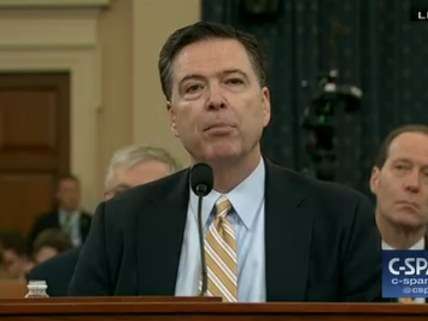Comey Confirms FBI Investigating Ties Between Russia, Trump Associates
Will assess whether anything illegal happened, but wouldn't provide details.

Yes, associates of President Donald Trump are the focus of an FBI investigation over potential connections to the Russian government and Russia's attempts to meddle with the 2016 presidential election, FBI Director James Comey confirmed in a House committee meeting this morning.
Comey would not discuss any details of the ongoing investigation or suggest that they believed that any crimes had been committed as yet. That's what the investigation was for. The public announcement confirms what had been leaked out from several sources already. Comey did say there would be an "assessment of whether any crimes were committed."
Furthermore, pretty much everybody participating on both sides of this House Intelligence Committee hearing was on the same side in concluding that Trump's tweets that he had been wiretapped by President Barack Obama were not supported by evidence. This doesn't necessarily mean that other types of surveillance might have happened. But parties dismissed the idea that wiretaps were involved, and Mike Rogers, director of the National Security Agency, explained that Obama would not have had the authority to simply order Trump to be wiretapped on his own.
Other than those two major news hooks, much of the rest of the questioning from the House committee, at least in the earliest stages, ping-ponged back and forth between the two parties' attempts to spin this entire scandal their way. For Democrats, this meant a heavy focus on Russia's potential meddling in the election. Though there has still been no evidence that Russian hacking altered the results of the election in any way, committee ranking member Rep. Adam Schiff (D-California) spent a good 15 minutes detailing the entire background of the targeting of the Democratic National Committee and Hillary Clinton's campaign pre-election for hacking and timed releases of private email discussions.
For Republicans, much of the focus was, first of all, pointing out that there was no evidence the election results themselves were altered by hackers, and then attacking the leaks coming out of the intelligence community, particularly wanting to track down and punish whoever it was who leaked to the press that Michael Flynn, Trump's short-lived national security advisor, had been talking to a Russian diplomat and—more importantly—had apparently lied to now-Vice President Mike Pence about it. The emphasis on the crimes of the leaks themselves may well have reached its strangest place when Rep. Trey Gowdy (R-South Carolina) made a show out of refusing to say Flynn's name when asking questions after making a big deal about how these intel leaks have the potential to violate the privacy of Americans.
There's a secondary goal here by pro-surveillance conservatives that helps make the line of questioning make a little more sense. It's not necessarily about protecting Trump and Trump's associates. It's about protecting the intelligence community's surveillance authorities. Rep. Tom Rooney (R-Florida), and other Republicans raised concerns that these leaks could compromise efforts to renew Section 702, an amendment to the Foreign Intelligence Surveillance Act (FISA) that details some authorities and restrictions on overseas or international surveillance that also ends up scooping up conversations or data from Americans.
Section 702 is going to sunset this year unless Congress takes action on it. Privacy and civil liberties groups have called for reforms to Section 702 to provide greater protections for Americans from having their information collected, stored, and used in domestic crime investigations without warrants. Surveillance advocates and the Trump administration itself do not want any reforms to 702 and want it renewed as it is. So the perception among Republicans on the panel was that the leaks revealing Flynn's name jeopardize the renewal of 702 because it shows that the American people can't trust that their privacy actually will be protected by the intelligence community.
It's yet another example of how people in position of power don't grasp the consequences of the abuse of authority until it's against them or their friends. Even so, there was little evidence the Republicans were concerned at all that the collection and use of the private communication was itself a problem but rather that the information was leaked.
And ultimately the partisan split in the discussions here presents us with a false choice. There's no reason why Americans shouldn't be concerned by a foreign power's breach of a political party's communications in an attempt to influence the election and at the same time worry about the dangers and long-term consequences of the intelligence community using agenda-driven links to attempt to damage the leaders of the executive branch (a.k.a. their bosses).


Show Comments (146)